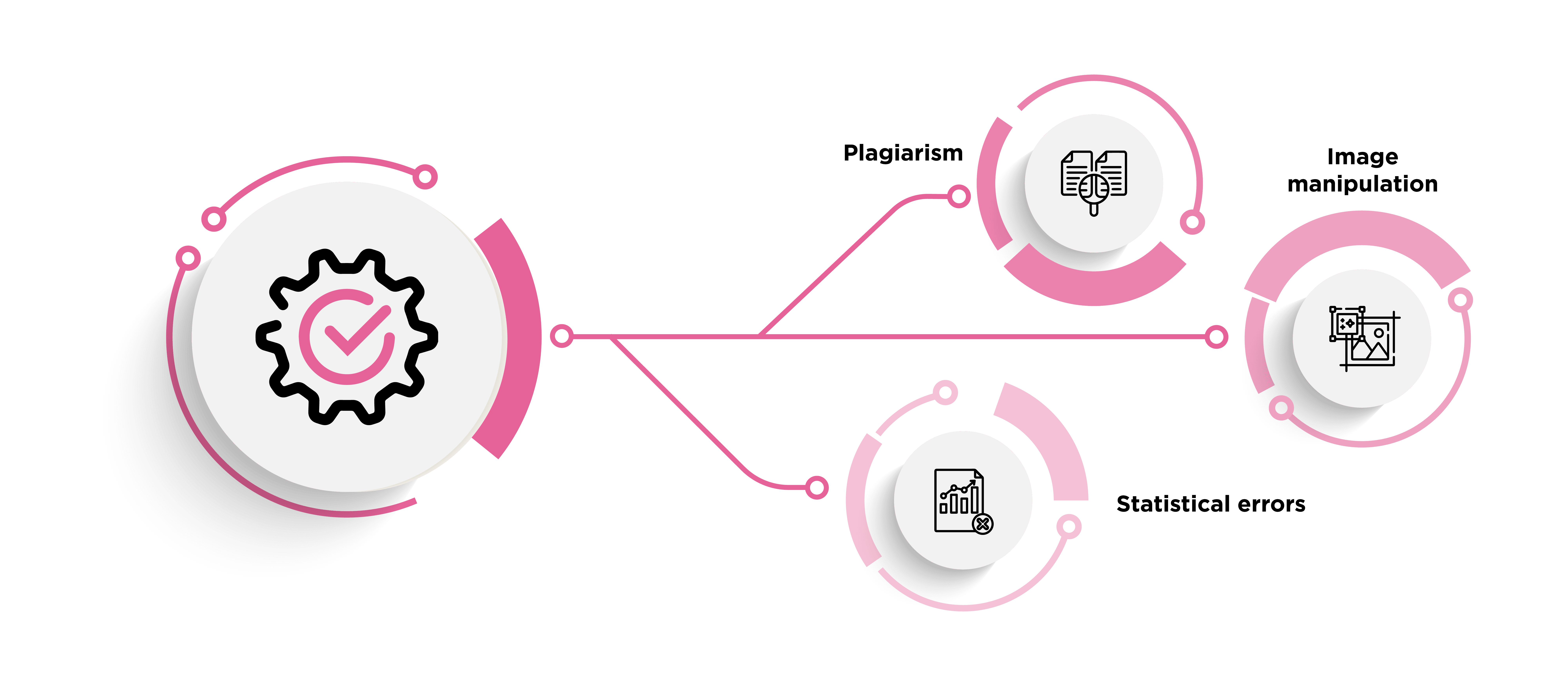Technology-Enabled Content Review: How Advanced Content Review is Improving Scientific Rigor
Posted on : October 16th 2023
Academic publishing is an essential part of the scientific research process, as it enables researchers to share their findings with the broader scientific community. Maintaining the integrity of the scientific record is paramount in ensuring that the research published is reliable and trustworthy. However, assuring the credibility of the research published is challenging, as questionable submissions can compromise the integrity of the scientific record. Publishers and editors are increasingly turning to advanced content review methods beyond traditional peer review to address this challenge.
The Need for Advanced Content Review
In today's digital age, where information is readily accessible, there is a growing need for advanced content review to improve scientific rigor. The sheer volume of published research makes it challenging for researchers to navigate and assess the accuracy of each study. Traditional peer review processes, although essential, are often time-consuming and limited in their ability to detect errors or biases. Advanced content review addresses these challenges by leveraging technology-enabled tools and processes.
By incorporating artificial intelligence and machine learning, advanced content review enables comprehensive analysis of scientific content, ensuring scientific accuracy and enhancing the integrity of published research. It also aids in detecting plagiarism, ethical breaches, and conflicts of interest, fostering a culture of transparency and accountability. Furthermore, advanced content review accelerates the peer review process, promoting timely dissemination of research and facilitating global collaboration.
Leveraging Technology for Advanced Content Review
To ensure the integrity of published research, publishers, and editors are using a range of advanced content review methods that leverage technology and expert review to examine every aspect of the manuscript. Automated checks utilize technology such as plagiarism detection software, image manipulation detection, and statistical error detection to ensure the content is original, accurate, and reliable. Expert review evaluates the study design, data analysis, and ethical considerations to ensure that the manuscript meets the highest standards of scientific research.

Technology plays a critical role in this approach. Automated checks for plagiarism, image manipulation, and statistical errors can be performed quickly and accurately, allowing reviewers to focus their attention on other aspects of the manuscript. Machine learning algorithms can analyze data and identify potential errors or anomalies, improving the accuracy and reliability of the data presented in the manuscript. Blockchain technology can also be used to maintain the integrity of the scientific record and ensure that the content published has not been tampered with or manipulated.
While leveraging technology for advanced content review brings numerous benefits, it is important to acknowledge the possibility of false positives. False positives occur when automated checks or algorithms mistakenly flag legitimate content as problematic or erroneous. These false positives can be a result of inherent limitations in the technology or the complexity of the content being reviewed.
To mitigate the impact of false positives, human review remains essential. Human reviewers possess the ability to exercise judgment, contextual understanding, and domain expertise that technology may lack. They can discern nuances, evaluate the significance of potential issues, and make informed decisions regarding the validity of the content. Their expertise ensures a higher success rate in identifying genuine problems and preventing false positives from hindering the publication of high-quality research.
While technology plays a crucial role in advanced content review, human review remains indispensable to ensure high success rates and minimize false positives. The ongoing refinement and improvement of automated checks and algorithms will gradually reduce the reliance on human reviewers, but their expertise, judgment, and contextual understanding will continue to be essential in upholding the integrity of scientific research.
Challenges and Future Directions
In-depth reviews can be time-consuming and expensive, which may be a barrier for smaller publishers or researchers who lack the necessary resources. Additionally, the review process can be influenced by the biases of the reviewers or algorithms used in the automated checks. To address these challenges, it is important to ensure that the review process is transparent and that reviewers are selected based on their expertise.
Despite these challenges, in-depth review is becoming increasingly common in academic publishing. Publishers and editors recognize the importance of maintaining the integrity of the scientific record and are taking steps to ensure that only high-quality research is published. By using a combination of technology and expert review, in-depth review can help to achieve this goal, benefiting the scientific community and society as a whole. In the future, continued development and implementation of technology-driven content review will likely become the norm, improving research quality and promoting research integrity in the academic publishing industry.
The Straive Advantage

Straive offers a comprehensive and streamlined approach to content evaluation, addressing the limitations of traditional peer review and providing a more robust assessment of scientific manuscripts.
Utilizing a combination of artificial intelligence (AI) technologies and expert review, Straive enhances the rigor and reliability of the content review process. State-of-the-art machine learning algorithms analyze data, detect errors or anomalies, and identify potential areas of concern. This technology-driven approach enables reviewers to focus their efforts on evaluating the scientific merits of the research, rather than spending excessive time on routine checks.
Straive's AI capabilities extend beyond automated checks, facilitating in-depth analysis of various aspects of the manuscript. By leveraging advanced algorithms, Straive helps publishers minimize the chances of questionable submissions slipping through the cracks and reaching publication, thus safeguarding the credibility of the scientific record.
Moreover, Straive offers a collaborative environment that fosters transparency and expertise. Multiple reviewers with diverse backgrounds assess the manuscript, mitigating the risk of bias and enhancing the overall quality of the evaluation. Additionally, the system facilitates seamless communication and discussion among reviewers, enabling a thorough examination of the research from different perspectives.
With its collaborative environment and efficient workflow, Straive empowers publishers and researchers alike to uphold the integrity of the scientific record and accelerate the dissemination of high-quality research.
Conclusion
Advanced content review is becoming the norm in academic publishing as publishers and editors recognize the importance of maintaining the credibility of the scientific record. By leveraging technology and expert review, publishers can identify questionable submissions and ensure that only high-quality research is published. Although advanced content review poses challenges, the benefits it offers to the scientific community and society as a whole make it a necessary step in the publishing process. As technology continues to advance, we can expect even more innovative approaches to content review in the future.
We want to hear from you
Leave a Message
Our solutioning team is eager to know about your
challenge and how we can help.